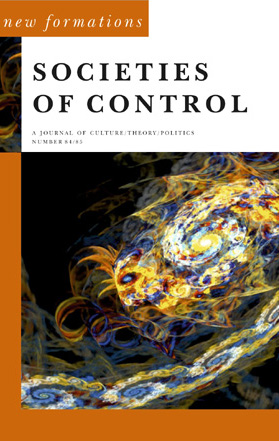
Modulation after Control
New Formations - Print ISSN 0950-2378 - Online ISSN 1741-0789
Volume 2014 Number 84-85
Modulation after Control
Yuk Hui
DOI: 10.398/NewF:84/85.04.2015
Abstract
Abstract
This article revisits the concept of modulation in Gilles Deleuze’s Postscript on Control Societies, in which he announces control societies as the new paradigm succeeding Michel Foucault’s disciplinary society. Deleuze characterises this shift in terms of a shift from ‘moulding’ to ‘modulation’, namely from a form-imposing mode to a self-regulating mode. The concept of modulation is crucial to Deleuze’s reinterpretation of the history of philosophy, where he employs it to turn against, for example, Aristotle’s hylomorphism and Kant’s transcendental categories. The role of modulation in Deleuze’s thought in general, and in the article on control societies in particular, reveals an aporia concerning the consistency of this concept: isn’t the idea of control societies a realisation of Deleuze’s philosophy? On the other hand it urges us to consider how modulation is realised through digital technologies, which occupy a central role in his article on control societies, and are further taken up by contemporary media theorists such as Alexander Galloway and Antoinette Rouvroy. This article attempts to address these two questions by looking again at the work of Gilbert Simondon, whose concept of modulation was an inspiration to Deleuze. For Simondon, the concept of modulation is closely related to technology, a dimension not sufficiently explored by Deleuze. By exploring Simondon’s 1961 paper ‘Amplification in the Process of Information’, this article elaborates on the concept of modulation, in relation to technical amplification and individuation. It attempts to show that how modulation can also be understood as a way to resist the tendency of ‘disindividuation’ in control societies, and that the ‘modulative’ mode of control societies is only one possible outcome from the philosophical concept of modulation. It concludes with a concrete practical example from within the development of alternative social networks.
SORRY - you are not registered as being permitted online access to the full text of this article
You have the following options:
- If you are viewing this via an institution or academic library you can ask that your institution takes out a Subscription to this journal.
- If you already have a Personal Subscription please login below
Forgotten your username / password? Click here to locate
- Purchase an annual Personal Subscription
PRINT + DIGITAL personal subscription (£45 / year)
DIGITAL personal subscription (£30 / year)
A Personal Subscription provides immediate access not only to the single article you are seeking, but also to all past and future articles in this journal up to the expiry of your annual (calendar year) subscription. - Purchase immediate access to this single article (UK£7.00) - Buy article Coming Soon
To cite this article
Yuk Hui (2014) Modulation after Control, New Formations, 2014(84-85 ). https://doi.org/10.398/NewF:84/85.04.2015
